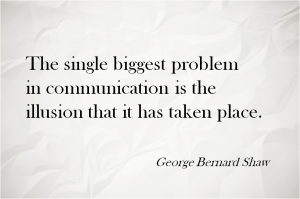A wife asks her husband: ‘Could you please go to the shop and buy one carton of milk, and if they have eggs, get 6.’
A short time later the husband comes back with 6 cartons of milk.
The wife asks him, ‘Why did you buy 6 cartons of milk?’
He replied: ‘They had eggs.’
Time to get prolific writer Bill O’Hanlon on board, who coined the term video talk.
1. Action complaints: what you don’t like – get specific
‘Get clear about what you mean, about what you don’t want. A verb is an action word, and the difference between action talk and usual conversations in relationships is that people sometimes use really vague terms that can be easily misunderstood by listeners.
Use video talk so that if there’s the potential for misunderstanding or there has indeed been a misunderstanding, I say to people: ‘Ok, describe what you mean by that term or that phrase as if we could all see and hear it on a videotape.’
2. Action requests: what would you like in the future – get specific
‘Get clear about your complaint. Once you have the clear action complaint (leaving in the middle whether that’s always necessary – note Peter), then I want to know from each person what the action request is. What do you want the other to do instead. More specifically, what do you want the other person either to do differently, start doing or stop doing in the future?
Mind reading or diagnosing people’s intentions or ‘personality traits’ is not the greatest thing to do when you’re having conflicts in a relationship. Don’t get into theory or the motivations of the other person by assuming that you know what they are.’
Source: ‘Love Is A Verb. Using Action Talk To Prevent And Solve Relationship Problems.’ – Bill O’Hanlon, 2013




